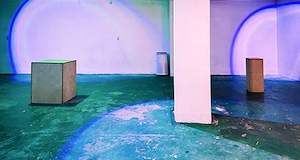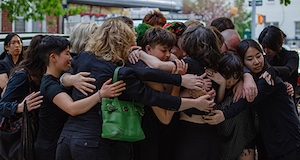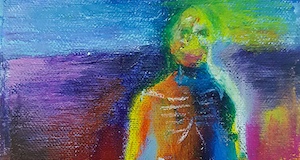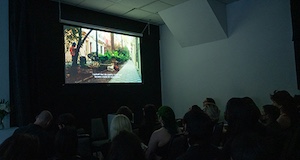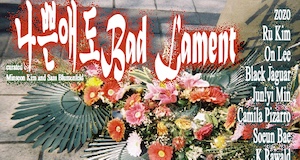Use your up, down, left, and right keys, or click within to navigate.
Zozo - Ru Kim - On Lee - Black Jaguar - Jun!yi Min - Camila Pizarro - Soeun Bae - K Rawald - Jungsik Lee + Hyoungju Kim
This text was submitted as a proposal to the apexart INTL25 Open Call
On October 29, 2022, two contrasting processions unfolded in Seoul. A small queer cultural festival in a local neighborhood filled the streets with percussive beats, drawing in residents who had never encountered the word "queer" before. For a brief moment, the community and queer youth danced together, celebrating an ephemeral yet meaningful sense of pride. Later that night, some festival attendees moved to Itaewon for the Halloween celebrations—only to find themselves caught in one of the most tragic crowd crush disasters in recent history. The news of the disaster spread faster than the official reports, leaving many desperately reaching out to friends who had gone to Itaewon, hoping not to hear their names among the victims.
The Itaewon tragedy, which claimed 159 lives, exposed the systematic erasure of marginalized identities. Despite Itaewon’s history as Korea’s only LGBTQ+ hub, no official reports addressed how many queer individuals were among the victims. The government’s public mourning excluded photographs and names, reducing them to anonymous statistics. Foreign victims' families faced bureaucratic barriers and language obstacles, highlighting the inequalities in collective grief.
This erasure is not new. From the 1948 "Jeju Massacre" to the 2014 "Sewol Ferry Disaster", mass deaths have been handled with systemic neglect, reinforcing the exclusion of certain communities from public remembrance. Globally, war, disaster, and social violence continue to shape who is remembered and who is forgotten. The proliferation of death burdens us with unresolved grief, manifesting in physical and psychological distress. While death is universal, its social and political treatment remains deeply unequal.
This project seeks to disrupt the rigid structures of mourning by envisioning alternative ways of collective grief. Through an exhibition and participatory programs, we challenge traditional mourning rituals and propose a queer, de-structured space for grief and remembrance. The show will feature artists working across installation, video, drawing, and performance, exploring death, care, and mourning through a queer lens.
In addition, the project reinterprets traditional mourning structures—such as Korea’s Manshin (shamanic rituals) and Judaism’s minyan (a collective mourning practice)—to establish a fluid, inclusive grief community. We seek to dismantle patriarchal and institutional mourning frameworks, embracing all voices in the grieving process. Instead of dictating how grief should be performed, we propose a space where mourning can be chaotic, fragmented, and nonconforming—where “bad mourning” is not a failure, but a form of resistance.
The title Bad La(men)ta 나쁜 애도 challenges normative grieving practices and reclaims the right to grieve outside societal expectations. In a world where public mourning often silences the marginalized, this project asserts that no grief is “wrong.” By embracing the voices of the “bad,” we carve out a space where loss is not only remembered but transformed into collective presence.
On October 29, 2022, two contrasting processions unfolded in Seoul. A small queer cultural festival in a local neighborhood filled the streets with percussive beats, drawing in residents who had never encountered the word "queer" before. For a brief moment, the community and queer youth danced together, celebrating an ephemeral yet meaningful sense of pride. Later that night, some festival attendees moved to Itaewon for the Halloween celebrations—only to find themselves caught in one of the most tragic crowd crush disasters in recent history. The news of the disaster spread faster than the official reports, leaving many desperately reaching out to friends who had gone to Itaewon, hoping not to hear their names among the victims.
The Itaewon tragedy, which claimed 159 lives, exposed the systematic erasure of marginalized identities. Despite Itaewon’s history as Korea’s only LGBTQ+ hub, no official reports addressed how many queer individuals were among the victims. The government’s public mourning excluded photographs and names, reducing them to anonymous statistics. Foreign victims' families faced bureaucratic barriers and language obstacles, highlighting the inequalities in collective grief.
This erasure is not new. From the 1948 "Jeju Massacre" to the 2014 "Sewol Ferry Disaster", mass deaths have been handled with systemic neglect, reinforcing the exclusion of certain communities from public remembrance. Globally, war, disaster, and social violence continue to shape who is remembered and who is forgotten. The proliferation of death burdens us with unresolved grief, manifesting in physical and psychological distress. While death is universal, its social and political treatment remains deeply unequal.
This project seeks to disrupt the rigid structures of mourning by envisioning alternative ways of collective grief. Through an exhibition and participatory programs, we challenge traditional mourning rituals and propose a queer, de-structured space for grief and remembrance. The show will feature artists working across installation, video, drawing, and performance, exploring death, care, and mourning through a queer lens.
In addition, the project reinterprets traditional mourning structures—such as Korea’s Manshin (shamanic rituals) and Judaism’s minyan (a collective mourning practice)—to establish a fluid, inclusive grief community. We seek to dismantle patriarchal and institutional mourning frameworks, embracing all voices in the grieving process. Instead of dictating how grief should be performed, we propose a space where mourning can be chaotic, fragmented, and nonconforming—where “bad mourning” is not a failure, but a form of resistance.
The title Bad La(men)ta 나쁜 애도 challenges normative grieving practices and reclaims the right to grieve outside societal expectations. In a world where public mourning often silences the marginalized, this project asserts that no grief is “wrong.” By embracing the voices of the “bad,” we carve out a space where loss is not only remembered but transformed into collective presence.
Minseon Kim is a curator working between Seoul and its surrounding regions, exploring alternative communal forms through exhibitions grounded in shared aesthetic experiences and queer sensibilities. Sam Blumenfeld is a queer artist and curator exploring post-race and post-gender practices through new media, performance, and trans-linguistic visual languages on the web.


